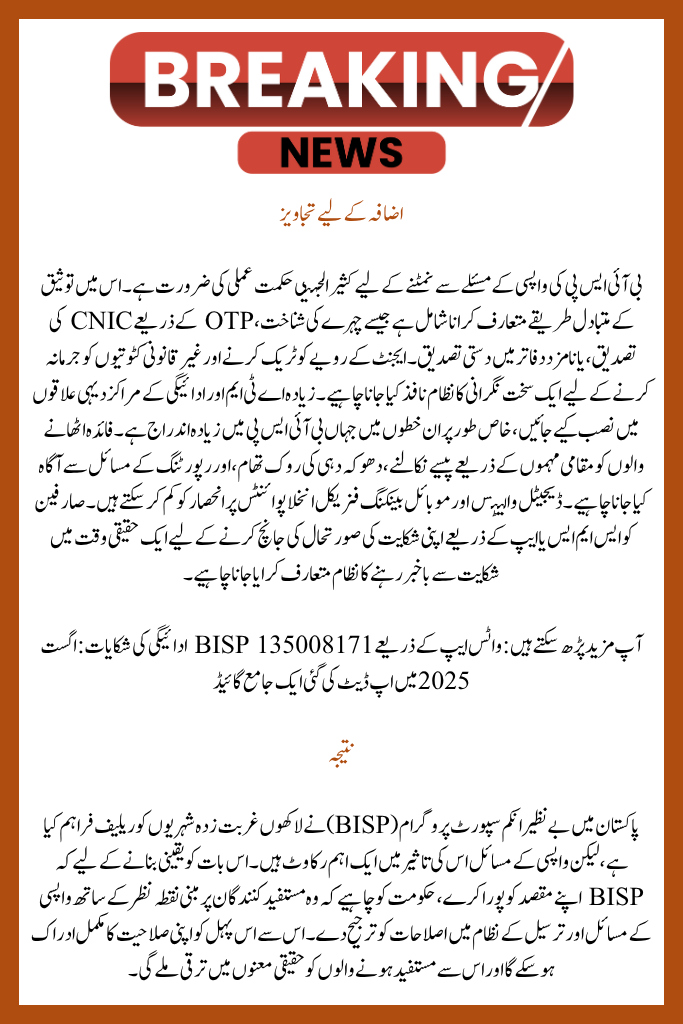The Payment from BISP
The Benazir Income Support Programme (BISP), launched in 2008, is a significant social safety net initiative in Pakistan, providing financial support to the poorest segments of society, particularly women. The program has evolved over time, now featuring digital payments and biometric verification. However, the withdrawal issue remains a persistent concern for beneficiaries.
You can read more: A Comprehensive Guide to Payment Registration and Monitoring
BISP provides quarterly cash assistance to millions of low-income families, covering essentials like food, clothing, education, and healthcare. The program targets women in households, empowering them financially and socially. Payments are made through ATMs, retail agents, or designated points via partner banks like HBL and Bank Alfalah.
The Withdrawal Issue: A Frequently Raised Problem
Beneficiaries’ Payment Challenges
• Biometric verification failures.
• Non-functional ATMs or limited cash availability.
• Long queues and poor infrastructure.
• Agents demanding illegal deductions.
• Connectivity and network issues in remote areas.
• Delays, loss of payments, and mental stress.
Failures in Biometric Verification
Biometric Verification Challenges for BISP Beneficiaries
• Biometric verification failure is a major issue for BISP beneficiaries.
• Many older women, manual laborers, or those with worn fingerprints struggle with biometric machines.
• Multiple attempts to verify the thumbprint can lead to rejection, preventing fund access.
• Lack of uniform alternative mechanisms forces recipients to rely on intermediaries, risking exploitation.
Payment centers and ATMs that don’t work
Issues with Payment Systems in Rural and Remote Areas
• Lack of functional ATMs and payment centers.
• Beneficiaries often encounter out-of-service ATMs, cash shortages, or absent bank representatives.
• Poor internet connectivity causes payment systems to remain offline.
• Balochistan, Gilgit Baltistan, and interior Sindh face severe issues due to limited infrastructure and digital connectivity.
Unlawful Withholdings and Agent Abuse
Retail Agents’ Illegal Deductions
• Retail agents often deduct fees for processing withdrawals, despite the service being free.
• Women often reluctantly accept these deductions due to lack of proper procedures or fear of confrontation.
• Agents may claim system downtime and offer assistance, keeping part of the payment.
• This reduces money reaching intended recipients and creates a distrust and exploitation environment.
Prolonged Lines and Physical Pain
Withdrawal Center Overcrowding
• Long queues at withdrawal centers, especially during new payment cycles.
• Elderly, disabled, and children in hot, unsafe conditions wait.
• Overcrowding can cause fainting, stampedes, or health complications.
• Undermines beneficiaries’ dignity and causes psychological stress.
• Contradicts BISP’s fundamental goals.
Effects on Vulnerable Groups and Women
BISP’s Women’s Issues
• Women are disproportionately affected by withdrawal issues due to lack of transport access and traveling alone.
• Frequent travel due to failed transactions increases financial burden.
• Lack of familiarity with ATM technology creates dependency, exposing women to exploitation and abuse.
| Category | Details |
|---|---|
| Program Name | Benazir Income Support Programme (BISP) |
| Target Beneficiaries | Poor families, especially women |
| Method of Payment | Retail agents, ATMs, and specific locations (via HBL & Bank Alfalah) |
| Key Issues | Biometric failures, agent deductions, non-functional ATMs, long queues |
| Government Measures | Mobile wallets, biometric vans, helplines, awareness campaigns |
| Suggested Solutions | Alternative verification, more ATMs, digital wallets, strict agent control |
Government Plans and Defects
The government has implemented various measures to address issues, including expanding payment centers, introducing mobile wallets, deploying biometric vans, implementing helpline systems, and launching public awareness campaigns. However, these efforts have been slow and inconsistent, with many beneficiaries unaware of these helplines or lacking access to mobile phones for complaint filing. Follow-ups are rare, and cases often go unresolved.
Suggestions for Enhancement
The BISP withdrawal problem requires a multifaceted approach. This entails implementing alternate techniques for verification, such as manual verification at certain offices, CNIC verification by OTP, or face recognition. A strict monitoring system should be implemented to track agent behavior and penalize illegal deductions. Beneficiaries should be educated through local campaigns on money withdrawal, fraud prevention, and reporting issues. Digital wallets and mobile banking can reduce dependency on physical withdrawal points. A real-time grievance tracking system should be introduced for users to check their complaint status via SMS or app.
You can read more: 8171 BISP 13500 Payment Complaints Through WhatsApp: A Comprehensive Guide Updated in August 2025
Conclusion
The Benazir Income Support Programme (BISP) in Pakistan has provided relief to millions of poverty-stricken citizens, but withdrawal issues remain a significant obstacle to its effectiveness. The government must give withdrawal concerns first priority and implement beneficiary-centered delivery mechanism change if it hopes to guarantee the BISP fulfills its objectives. This will allow the initiative to fully realize its potential and truly uplift its beneficiaries.

FAQs
1. What should I do if the payment center’s biometric verification doesn’t work?
Try again up to three times if biometric verification doesn’t work. Call the BISP helpdesk at 8171 or stop by the closest BISP office for another form of verification if it still doesn’t work.
2. Are agents allowed to take money out of my BISP payment?
No, withdrawals from BISP are free. Report any deductions made by an agent right away by calling 8171 or using the BISP WhatsApp complaint system.
3. How is the government addressing issues related to withdrawal?
Although the government is implementing awareness campaigns, deploying biometric vans, introducing mobile wallets, and expanding payment facilities, many places are still not fully covered.
